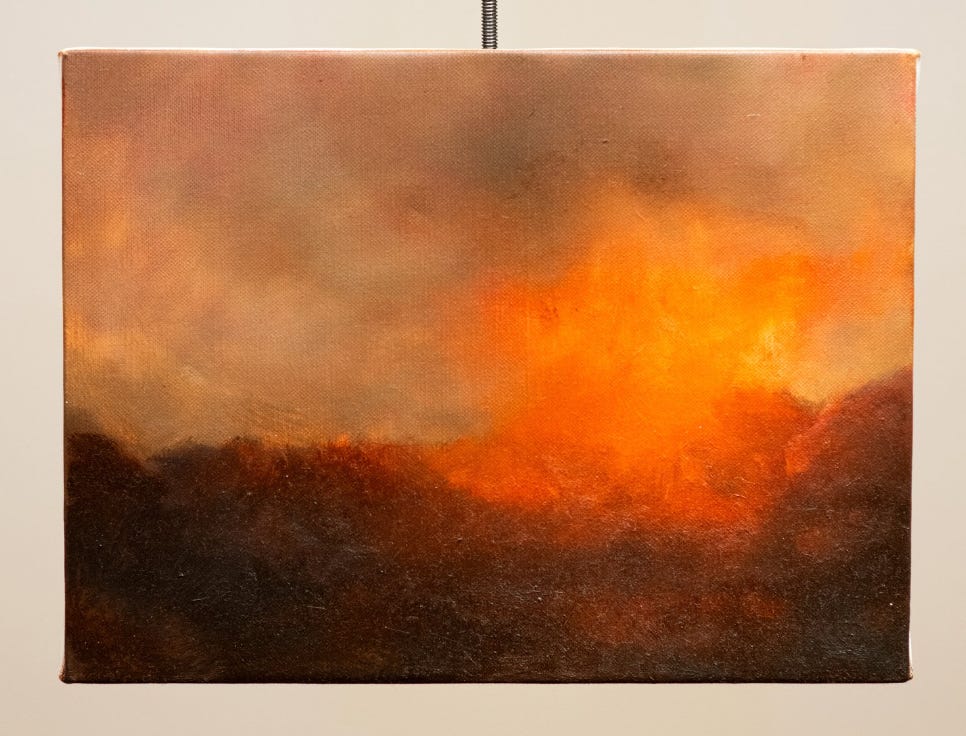Making Civic Life Thick Again; Rashid Khalidi in Haaretz; Remembering Canarsie
Reading, Watching 12.01.24
Good morning! This is a regular feature for paid subscribers wherein I write a little bit about what I’ve been reading and/or watching. Hope you enjoy!
If you are not already a paid subscriber, please consider becoming one. This newsletter is my main source of income and is completely reader-supported. At 5 dollars a month, it comes to significantly less than most menu items at Starbucks.
When The Clock Broke was named one of the “100 Notable Books of 2024” by The New York Times.
Also, if you live in New York City, I currently have a painting up at American Standard Co. for Art & Design on 35 Allen St.
I also broke down and created a Bluesky account: I’m not crazy about the vibe there but the site doesn’t throttle links like Twitter does so I’m gonna use it to share writing mostly.
In case you missed it, Friday’s newsletter tried to tackle the contradictions of Trump’s administration through the framing device of Sam Francis vs. Murray Rothbard. How can we understand how tech-libertarians who want to slash and burn regulations and taxes can make common cause with national populists who demand a powerful state to make American industry great again? This might be one way to think about it.
I’m sure everyone is tired of “postmortems,” but I still highly recommend Daniel Schlozman and Sam Rosenfeld’s piece in Democracy:
Biden-era Democrats have hardly been in denial about the challenge of class dealignment. Ambitious and progressive economic measures to remake markets, they believed, could simultaneously shift politics back to material questions and, through what political scientists term “policy feedback,” win back the allegiance of wayward working-class voters. This was hardly a far-fetched or unserious theory. But as a political bet, it didn’t pay off. In a bitter lesson for liberal technocrats’ ambitions, the attempt to make electoral hay out of well-designed policy alone must be counted as a failure.
That suggests a daunting conclusion about the task to reforge the frayed bonds between working people and the party that governs in their name: to focus, instead, on long-term organizational renewal in the local centers of civic life—union halls and party headquarters among them—that have in the past joined people together across class and educational divides. Parties in their organizational heyday, at the apogee in the nineteenth century and continuing long into the twentieth, did not merely draw electorally from that thick civic life; they embodied it directly. They served as training grounds for thinking politically, as they did for young Nancy D’Alesandro. And their vibrant public face made politics fun.
I partly share the diagnosis of the “civic hollowing out” school of explaining small-d democratic and big-d Democratic decline but I’m really not sure how to revitalize social bonds. I think we live under very different material conditions than the 19th and 20th centuries and the Republicans have gotten there faster. And I think the form of subjectivity the Internet is generating is more amenable to reactionary politics. Sorry to be a downer! More on this in the weeks to come.
One thing I think everyone should read is the interview in Haaretz with Palestinian historian Rashid Khalidi. His remarks are very frank. For anyone who’s been puzzled by my beliefs about the Israeli-Palestinian conflict, I find very little to disagree with him here. His major point: “[Israelis] need to understand something that's very hard for them to grasp: how the Palestinians and the rest of the world see the situation.” But I was also struck by something else he said in the interview, noting the difference between the situation in Israel and other wars of national liberation: “It's harder than any other liberation struggle because it's not a colonial project in which people can go home. There is no home. They [the Jews] have been in Israel for three or four generations. They're not going anywhere.” And then there was also this point:
On this point, in your book you quote Eqbal Ahmad, the Pakistani intellectual who worked with Franz Fanon and the FLN, the Algerian liberation movement. In the early 1980s, the PLO tasked him with assessing their military strategy. He argued that unlike in the Algerian case, the use of force against Israelis "only strengthened a preexisting and pervasive sense of victimhood among Israelis, while it [also] unified Israeli society."
"Yes, and I think that is something extremely important. If you're talking about the French [in Algeria], I would argue that placing a bomb in a café violated both moral and legal sanctions, it's a violation of international humanitarian law. Two heroines of the Algerian revolution – Jamila Bouhired and Zahra Zarif – did that. At the political level, I think it's debatable, because the colons [French settlers in Algeria, also known as the pieds-noirs], in the last analysis, have somewhere to go back to. They suffer what I call 'colonial fear.' They are terrified of the indigènes [indigenous population], because the indigènes outnumber them and they know the indigènes resent them.
"But they don't suffer from a hereditary fear of persecution. They don't have a mobilized narrative whereby every attack on them is placed within that context, rather than within the local context of Algeria. And ultimately, that violence is successful. Morally, the attitude toward indiscriminate violence is black and white. But it's gray politically. What Eqbal Ahmed says about Israel is that because of the nature of Jewish history, a strategy of indiscriminate violence – which the PLO was then pursuing – is politically counterproductive."


